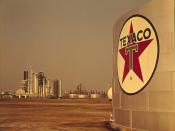What do you think the real reasons for Chevron Texaco merger are? Unlike previous mergers in the oil industry, it appears that the Chevron-Texaco merger was instigated more from a lack of size, than from a financial advantage. The two companies on a stand-alone basis could not effectively compete with the merged might of the likes of BP Amoco Arco, Exxon Mobil and TotalFinaElf.
There is some truth to oil management's arguments that they can increase cost-cutting and efficiency by merging. Particularly in the area of exploration and production, where in "new frontier" areas such as the former Soviet Union, risks are high both because of political and economic factors, such mergers increase the pool of capital available to one firm to take such high risks.
While it is less true in refining and marketing, mergers and joint ventures do allow economies of scale, through building new facilities on a larger scale or by shifting production to one refining facility while closing down another.
However, the essence of such economies of scale is the reduction in the amount of labor needed to produce a given amount of output.
The Chevron Texaco merger might also have been motivated by management?s gain perspectives. Top management probably saw in this merger the opportunity to get larger salaries and ?golden parachutes? that would secure any possible future outcome of the merger. According to a Pearl Meyer & Partners study of the top 200 U.S. companies, 90 percent of a CEO's pay is tied to performance, and more than half of that pay is in stock-option grants. It's no longer unusual for the CEO's equity stake to top $100 million, and mergers often involve sizable new grants and generate major windfalls.
Ego could be a major factor in driving mergers, as executives want...


